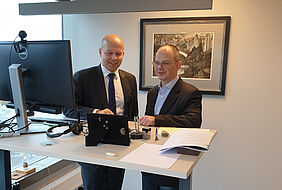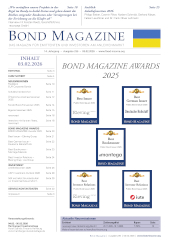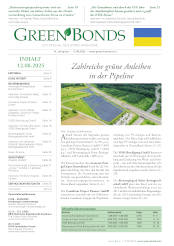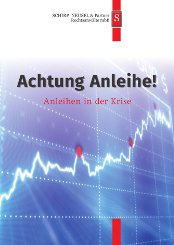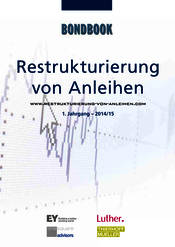Tarmo Sild, CEO of IuteCredit Group, explains in an interview with BOND MAGAZINE the current business development and the influence of the corona pandemic on IuteCredit. The online data since gradual lockdown easing since May indicate that repayment discipline is recovering, as Tarmo Sild emphasizes. IuteCredit is challenging themselves to make a profitable 2020.
BOND MAGAZINE: How are you and how was the Corona pandemic in Estonia? What were the local curfews in March and April?
Sild: We are very grateful, that our teams, as well as the vast majority of our customers, have stayed in good health everywhere. The virus itself did not have any medical consequences – we were able to fully deal with the financial impact of the lockdown regulations and the worries of our customers. In Estonia, we discovered once again, how good and advantageous it is to be a full-scale e-country and to be able to get the business done from the distance if needed. Consequently, we have been running the business from our headquarters in Tallinn and with local management teams, without any travel. So far, it’s working surprisingly well. Having said that nothing can replace “the human touch”. Sensing the world and people through telecom and IT solutions is less effective. I guess that’s why I personally also miss live theater and concerts.
BOND MAGAZINE: What were the curfews in the countries in which you are active?
Sild: Across our markets, it can be said that the restrictions introduced suddenly, over a period of two weeks from the middle of March, were predominantly closed borders, movement restrictions, and, with the exception of daily needs, closed shops, schools, and public places. In the meanwhile, the conditions are changing really very fast, depending on the type of easing. The design of the individual restrictions was then very different from country to country. When you look at our two largest businesses, for example, the freedom of movement of the citizens in Albania was initially limited to one hour per day between 5.00 am and 1.00 pm, while in Moldova the restrictions of movements mainly concerned and still affect people over 63 years of age. Common to all countries were the most extensive closures of shops. In contrast, in Albania, car traffic from one city to another was completely prohibited. As you can see, these are only examples of how severely people’s lives and thus their ability to do business – also with us – were restricted. From what I’ve heard, you got off lightly in Germany. We hope that the easing will continue and that the restrictions will perhaps be lifted completely in June.
BOND MAGAZINE: Please tell us the financial highlights of the first quarter.
Sild: Until the first week of March, we continued to grow about +5% every month and made profit as usual. On a quarterly basis, the growth however is not so visible as we stepped on the brakes hard in the second half of March, even before lockdowns were imposed, wiping out ten weeks of portfolio growth within the last three weeks of the first quarter. Instead of accelerating growth, we started to cash in, while limiting the issuance of new loans. Eventually, the lockdowns slowed the demand side as well, so loan issuance fell in April by about 90%. Lockdowns also started to affect the repayments. Initially, repayments suffered only because free movement was limited, and some people were afraid to give away their money. Over time, we expect that the loss of income will have its own impact on repayments.
Metaphorically speaking, the situation in Q1 developed as if you were watching a good movie and started to smell real smoke. So, the good movie rolled on, but we were not waiting for the happy end. We jumped off our seats and made the way to the exit door.
That means we began to act on our basic instincts to preserve the precious portfolio and cash before it got too bad. Of course, getting out was particularly hard during the first week, because we saw how our microfinance and banking competition continued to advertise and attract loan customers, while the lockdowns were not yet in place.
In Q1 results one can see that our net profit was smaller than usual because 2/3 of the profit was lost in the balance sheet to a depreciation of Moldovan Lei and Albanian Lek in response to the pandemic. Meanwhile, the Lek and Lei have both recovered to pre-crisis levels in April.
BOND MAGAZINE: How did the net loan portfolio and the loan repayment behavior develop?
Sild: The net loan portfolio in absolute terms increased from 79 million Euro to 80 million Euro. Our gross loan portfolio grew even more, but we increased the provisions for future loan impairments.
Part of this increase in provisions was pre-emptive which in turn was because we were already seeing a worsening in the repayment discipline of our customers.
BOND MAGAZINE: Do you have more recent figures than March?
Sild: We have online figures for quite a few things. But it is important not to jump to hasty conclusions. What we have seen, for the time being, is that during the worst lockdown period in April, monthly repayment discipline dropped by 15 points. The Group’s usual CPI was around 88, which means that 88 Euro out of 100 Euro monthly repayments for every ongoing month were easily repaid by customers. Another 12 Euro became late for longer than 30 days. In a nutshell: In pre-virus times approximately 12% of our customers had some issues to make their current monthly installment. During the lockdowns, this figure increased to about 27%. At the same time, the online data since gradual lockdown easing since May indicate that repayment discipline is recovering, and we are now only about 7 points behind pre-virus levels. The key question is, whether the positive trend continues. Clearly, 2020 will be a challenge for IuteCredit team and its customers, as well as IuteCredit’s shareholders. I am convinced that the interests of our debt investors are securely protected by a thick fortress wall of cash, equity, and a conservative balance sheet. So far, we have coped with this challenge very well and I hope Q2 results will shed more light on the future.
BOND MAGAZINE: What is your current cash position?
Sild: The Group’s treasury amounts to more than 10 million Euro, plus the balances of current accounts and local treasuries in five jurisdictions. In April and May, we also reduced our debt by more than 10 million Euro. Principal repayments were made to P2P platform Mintos investors, and some local creditors, to keep the optimum balance between liquidity and interest costs. You see, too much liquidity is also a problem because it comes at an interest cost.
BOND MAGAZINE: Regulation of non-bank lending is increasing in many countries. What is the situation like in Moldova, Albania, and North Macedonia?
Sild: Regulations are becoming stricter and as a general trend, that suits us. We are in favor of sustainable lending, as opposed to payday and misery lending. Thus, we believe in lending that makes a positive social impact for our customers, their families, and for society as a whole. We support transparent lending, as opposed to hidden fees or bypassing annual percentage rate (APR) cap regulations. Speaking of recent times, the current regulatory changes are COVID-19-related. We believe that the reasoning behind grace periods is perfectly understandable, and at the same time, we are glad that regulatory authorities also understood that grace periods are not mandatory but optional solutions. Customers have to pay the full interest for the loans taken out, because after all we also have to meet our obligations as a debtor to investors, as employer, tenant, and taxpayer, which we have entered into in order to be able to issue these loans.
BOND MAGAZINE: Do you plan to get active again in Kosovo?
Sild: The first step in Kosovo is to win the international arbitration against the local government, receive adequate compensation, and maybe restore the license. We will assess the situation en route. Currently, we are making progress in the legal field. In this context, I would like to point out that our former Kosovo business has received more than 4 million Euro in scheduled repayments from customers since December 2019. This money is under the control of a state-appointed liquidator but is not being distributed. It is not in our balance sheet either. From the point of view of the rule of law, the money should then ultimately also accrue to us, as the sole creditor and shareholder of the business in Kosovo. Operationally, we have learned a lot in Kosovo about the qualities of the country and the way how it is governed.
BOND MAGAZINE: A banking license has several advantages. Is buying a bank an option for you?
Sild: On the one hand, the banking system was historically designed to create synergies between customers who needed to deposit surplus money, customers with a deficit who could borrow and pay for it, and customers who just wanted to make payments against a fee. Thus, the emergence of the fintech sector is proof that the traditional banking sector failed somewhere and somehow. On the other hand, we see as a long-term trend that banks themselves are becoming fintech in the attempt to re-create synergies. Maybe some banks would greatly benefit from an additional fintech drive. For us, a fintech, a banking license could make our business riskier and more regulated at the same time.
BOND MAGAZINE: A few weeks ago, you tried to buy back loans below the nominal value on the Mintos platform. Was it successful?
Sild: It was neither a success nor a failure. We were willing to buy back up to 5 million Euro debt with maturity of up to one year. In fact, there was no sign among Mintos investors to sell their loans back at a discount, which was initially 15% and eventually 10%. Conversely, a smaller discount would not have made much sense for us.
In our calculations, we compared two basic scenarios: How much would we yield if we spent our money on early debt buyback, and how much would we earn if we lent the money to customers at certain annual percentage rates (APR) and customer performance expectations?
As we see it, the Mintos investors made their own calculations and decided that their return was bigger if they kept their IuteCredit loans. Accordingly, the investors had to make a decision, that they trust IuteCredit enough.
BOND MAGAZINE: During our last meeting, you said that you also want to be active in Bulgaria. How is the planning for this?
Sild: We have already opened our business in Bulgaria and created both a small customer pool and loan portfolio by early March. With the outbreak of the pandemic, however, we put spending on growth in Bulgaria on hold. The resources are used to successfully weather through the troubled times in countries where we have significant capacities and prospects to operate profitably. We have taken literally in our decision, as you would say in German: “Klotzen, nicht kleckern!”
BOND MAGAZINE: Where do you see IuteCredit in two to three years and which key figures are you aiming for?
Sild: We have just withdrawn our earnings expectation for 2020 and you ask for figures about 2022! It would be much easier to give an estimate for 2022 if someone could tell us, when and to what extent the financial impact of the pandemic on the economy will be limited and what new social regulations will become in place. What I can tell you, is that we are challenging ourselves to make a profitable 2020 first, and we certainly want to stay in the countries where we are doing business now. It is probably not unrealistic to expect that a disciplined contraction of the balance sheet will be followed by growth, again. When we talk about growth, we mean multiplied growth. The reason is that there are also positive factors, on which we are willing to bet.
The first factor is the ongoing global reorganization of supply chains and relocalization of production. As a result, we expect more European production in the Balkan countries and, as such, more employment and more income for our customers.
The second factor is the boost to digitalization. Lockdown regulations all over the world show that the traditional administration with paper, ink, and personal visits can no longer be maintained if you really want to achieve something.
The third factor is that we are developing internally at IuteCredit. To put it clearly, a lack of external growth does not prevent us from pursuing internal improvements.
As regards these three factors, we are very well positioned today: We have so far withstood the situation and the forces around us that are way bigger than our current 100 million Euro company.
Christian Schiffmacher conducted the interview.
The text has been shortened. The full interview can be found at www.fixed-income.org.
IuteCredit-bond – Key figures
Eckdaten der IuteCredit-Anleihe
Issuer | IuteCredit Finance SA (Luxemburg) |
Format | senior secured |
Volume | 40 Mio. Euro |
Denomination | 1.000 Euro |
Maturity | bis 07.08.2023 |
ISIN / WKN | XS2033386603 / A2R5LG |
Coupon | 13,00% |
Price | 83,55% (03.06.2020) |
YTM | 21,8% |
Internet |

